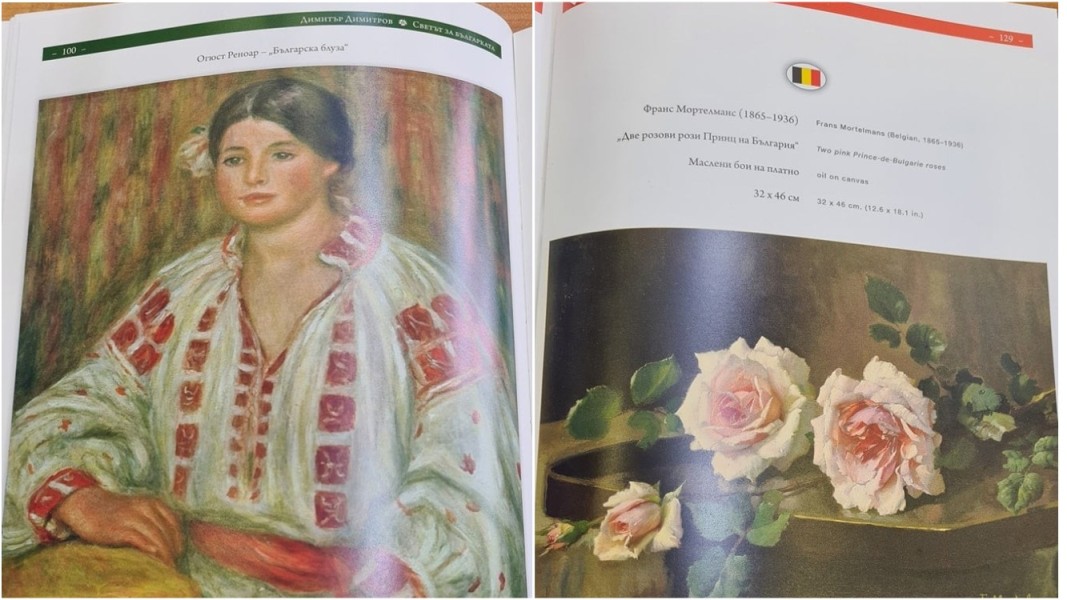Dimitar Dimitrov, a journalist with the BBC for many years, and, as he himself puts it a “Bulgarologist”, presented his new book in Sofia called “The world for the Bulgarian woman”.
The multilingual book is the first of a future series based on texts and illustrations from books, musical pieces, postcards and magazines, which make mention, in one form or another, of Bulgarian women, of their skills, appearance and attainments. The selection includes 15 publications, in different languages covering a period of six centuries. The subtitle is: April uprising. Roses, fashion, art, and it was invented by Dimitrov a long time ago – in the mid-1990s. Just as the series already in circulation “The world for the Bulgarian warrior”, the current “women’s” series is planned to comprise 4 books.
“The book begins with a quotation, and I would like to emphasize that everything in it is scanned from original sources in French, German, English. And that quotation concerns the year 1444, the time of the campaign by Vladislav Varnenchik (Władysław of Varna), which ended with the battle at Varna. The French book in question, published in the 19th century, makes mention of a Bulgarian fortune teller called Sekusa, who advised the king of Wallachia not to join the campaign. He did not heed her advice and history is what we know it to be.”

Dimitar selected the sources of the material in his book “The world for the Bulgarian woman” himself. His good command of French, German, English and even Swedish have been a great help in his search and in the translation of many of the texts.
“Let me mention a fascinating piece – in a French magazine from 1890 I found two pages about Bulgarian embroidery, describing the stitches, and it filled me with great respect for what Bulgarian women could do with a needle. There is a really interesting first page from a Danish magazine from 1877, during the Russo-Turkish war, which, instead of illustrations from the war, gives a drawing of rose-picking season in Bulgaria and makes mention of Shipka peak. Another family magazine in Denmark from 1890 shows a comb-making workshop on its front page – men processing horns, probably buffalo and ox horns, and fashioning them into combs for women. An English magazine from 1877 shows a goldsmith’s workshop in Sofia making casts for jewellery for women.”
The journalist is proud of the musical compositions dedicated to women in this country which he has been able to discover. One of them is from 1909, by a French composer. It is his dream to one day collect as many works as he can and bring them to life in a history concert. The first book from the series “The world for the Bulgarian woman” may begin with a 16th century quotation, but it ends firmly in the present day.
“On the last pages I have included actress Maria Bakalova, in the Arts chapter.”
In books 2, 3 and 4 of the series, Dimitar Dimitrov intends to present how the position of Bulgarian women has changed in the family and in society through the years, again according to international sources.
Interview by Mariana Gancheva, Hristo Botev channel, BNR
Editing by Vessela Krasteva
Photos: library
Konyovets village near Shumen is marking 160 years since the oldest stud farm in Bulgaria was set up. Celebrations are being organized on the farm on 1 November when officials from the Ministry of Agriculture and Food and of the State Fund..
The Professional Association of Robotics, Automation and Innovation s unites over 80 Bulgarian and international companies that have one global objective - to establish our country as a center for technology development . To achieve this dream,..
The votes in the early parliamentary elections on October 27 outlined an even more diverse parliament. The initial forecasts were for a 9-party National Assembly, but the results that the CEC announced after processing all the..
The traditional Bulgarian Christmas picnic, organized by the Bulgarian Cultural and Social Association "Rodina - Sydney" and the Bulgarian School..
Two graduates of the Bulgarian School "Saints Cyril and Methodius" in Jordan presented their achievements at an event at their school "Hadi al Muhammadi"..
Radmila Sekerinska from North Macedonia appointed NATO Deputy Secretary General NATO Secretary General Mark Rutte has appointed Radmila Sekerinska..

+359 2 9336 661
